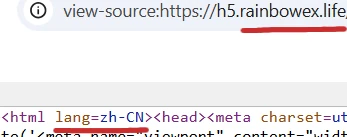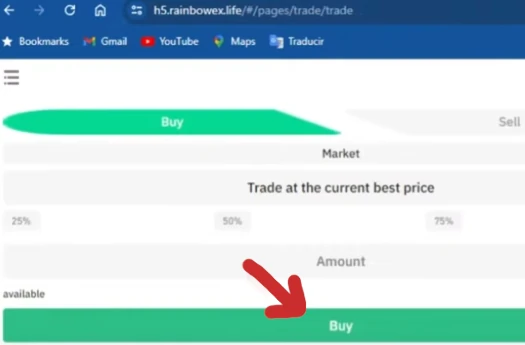RainbowEx Review: Trading signals “click a button” Ponzi
RainbowEx fails to provide ownership or executive information on its website.
RainbowEx’s website domain (“rainbowex.life”), was was privately registered on July 2nd, 2024.
If we look at the source-code of RainbowEx’s website, we find it is localized to Chinese:

This suggests whoever is running RainbowEx has ties to China.
As always, if an MLM company is not openly upfront about who is running or owns it, think long and hard about joining and/or handing over any money.
RainbowEx’s Products
RainbowEx has no retailable products or services.
Affiliates are only able to market RainbowEx affiliate membership itself.
RainbowEx’s Compensation Plan
RainbowEx affiliates invest tether (USDT). This is done on the promise of an ongoing passive return.
RainboxEx pays referral commissions on invested USDT down three levels of recruitment (unilevel):

- level 1 (personally recruited affiliates) – 20%
- level 2 – 15%
- level 3 – 10%
Joining RainbowEx
RainbowEx affiliate membership is free.
Full participation in the attached income opportunity requires an undisclosed minimum investment in USDT.
RainbowEx Conclusion
RainbowEx is yet another “click a button” app Ponzi scheme. While the underlying fraud is the same though, RainbowEx is set up a little differently.
Since inception a few months ago, RainbowEx has been pillaging Argentina.
As of September 2024, SimilarWeb tracked 3.5 million monthly visits to RainbowEx’s website. 95% of that traffic originated from Peru. The remaining 5% is split between Chile and Peru.
Attached to RainbowEx we have something called Knight Consortium.

Knight Consortium is set up on the domain “knightconsortium.com”, first registered in October 2023.
Knight Consortium is represented to be run by what looks like AI generated avatar executives:

In reality Knight Consortium is run by the same Chinese scammers behind RainbowEx:

On behalf of Knight Consortium, Argentinian RainbowEx promoters have set up local charity drives. This is an attempt at legitimacy via misdirection; donate a bit to local charities whilst financially plundering Argentina on a massive scale.
To be clear, any activities external to RainbowEx’s underlying fraud does not justify said underlying fraud. This includes anything associated with the attached Knight Consortium marketing arm.
RainbowEx’s “click a button” Ponzi ruse is trading signals:

The presented ruse is RainbowEx affiliates log in and click a button (the more invested the more the button needs to be clicked).
Clicking the button purportedly ties into executing provided trading signals. For some reason RainBowEx can’t execute these trades on their own, instead opting for the ruse of sharing trading profits with investors.
If that makes no sense it’s because it doesn’t. Why get randoms to click a button in a dodgy app when you could just execute the trades yourself?
In reality clicking a button inside RainbowEx’s app does nothing. All RainbowEx does is recycle newly invested funds to pay earlier investors.
RainbowEx is part of a group of “click a button” app Ponzis that have emerged since late 2021.
Examples of already collapsed “click a button” Ponzis using the same app ruse include SDT Quant, Pitrex, and TOST.
Since 2021 BehindMLM has documented hundreds of “click a button” app Ponzis. Most of them last a few weeks to a few months before collapsing.
“Click a button” app Ponzis disappear by disabling both their websites and app. This tends to happen without notice, leaving the majority of investors with a loss (inevitable Ponzi math).
Argentina’s La Nacion reported RainbowEx disabled withdrawals on Monday, October 14th. Shortly after a “regulators!” exit-scam was rolled out;
The message is titled: “Important notice from Rainbow Exchange: Arrangements for withdrawal from the Argentine market and account activation.”
Then, it says: “Dear Argentine users:Due to the agreement reached between Rainbow Exchange and local regulators, We will officially withdraw from the Argentine market and fully update the platform.
To ensure a smooth progress of this adjustment, all Argentine and related accounts will be reset to an inactive state.”
To be clear to anyone reading this, RainbowEx has not reached any agreements with any regulators. Coming up with baloney exit-scams is typical of Chinese app Ponzis.
As part of its exit-scam RainbowEx initiated a recovery scam. RainbowEx investors were told withdrawals would be re-enabled if they paid an 88 USDT fee.
La Nacion reports that as of October 15th, an additional 230,000 USDT has been fleeced from gullible RainbowEx investors.
RainbowEx withdrawals remain disabled.
Argentinian authorities raided two top local RainbowEx promoters last week. This appears to be the actual reason the Chinese scammers behind RainbowEx pulled the plug.
Eduardo Maximiliano Braga was one of the raided suspects. He is accused of stealing over 320,000 USDT through RainbowEx.
Luis Alberto Pardo is the second raided suspect. Pardo is accused of stealing at least 223,083 USDT through Rainbow Ex.
The Chinese scammers behind RainbowEx, likely operating out of Dubai or Asia, remain at large.
Organized crime interests from China operate scam factories behind “click a button” Ponzis, typically from south-east Asian countries.
In September 2024, the US Department of Treasury sanctioned Cambodian politician Ly Yong Phat over ties to Chinese human trafficking scam factories.
Through various companies he owns, Phat is alleged to shelter Chinese scammers operating out of Cambodia.
Regardless of which country they operate from, the same group of Chinese scammers are believed to be behind the “click a button” app Ponzi plague.
Update 23rd November – Sometime in the last month RainbowEx’s website has been disabled.


Till authorities around the world do something about Chinese Ponzi app scammers, this nonsense will continue.
Every stupid app that gets put up on BehindMLM goes nowhere or is pulled within a few days. Every now and then one gets through though and, as we’ve now seen in Argentina, rinses the country’s dumbest people for all they’ve got.
It’s boring as dog shit to cover these app scams but I kind of have to till something gives.
Thanks for your work, Oz.
Unfortunately, in the Argentine city of San Pedro, out of a total population of 70,000, around 20,000 people have been affected by this ridiculous scam. And every day, we discover another city with hundreds or thousands of victims.